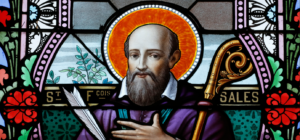
The Patron Saint of Journalists and Writers: St. Francis de Sales
People who work with the written word have to get their inspiration from somewhere. Many writers, journalists and editors in Catholic communications turn today to St. Francis de Sales.
Recent popes have chosen Jan. 24, the feast of St. Francis de Sales, as the day on which they release their annual statement for World Communications Day. In this 16th century evangelist, communicators have a kindred spirit as someone who loved to put language and writing to the service of spreading the Good News.
Priest, bishop, Doctor of the Church and patron saint of journalists and writers, Francis is remembered for his work in a place and time in which it was supremely difficult to be a Catholic — Geneva during the Reformation.
He was born into a noble family in 1567 in the Duchy of Savoy, in what is now a part of France. Though his father planned a career for his son in law and politics, Francis had other ideas. While studying law, he also studied theology. While learning the courtly ways of a young nobleman, he also worked attentively with a spiritual director. It took some years, but Francis was eventually able to persuade his father that the Church called him more than the state.
Francis was ordained in 1593 and was appointed coadjutor bishop of Geneva in 1599, becoming bishop in 1602. At this time, Geneva was very much in the control of the Calvinists. Religious tension was extremely high and his life was often threatened. In fact, he had to rule his diocese from Annecy in France.
The young bishop dedicated his life to bringing many Catholics who had left the Church back into the fold. One of his most important tools was his writing. Through letters and written sermons distributed door-to-door, Francis helped to persuade thousands to return to Catholicism.
His most famous book is Introduction to the Devout Life, which inspired many to dedicate their lives to the faith. His example has also been modeled by many religious communities, most notably the Salesians of Don Bosco, and he also influenced the Paulist Fathers.
Francis died in 1622, so his 55 years spanned a significant part of the Reformation, in which Europe’s devotion to Catholicism shattered into schism, with the spread of numerous Protestant variations on Christianity. In his use of the written word, he was very much a man of his time. The Reformation was so successful, in part, because literacy and the new printing press were having an enormous impact on the public’s base of knowledge. Francis used the latest intellectual tools available to him in his devotion to his mission of evangelization.
Today, the Church continues to urge Catholics to use all the tools of social communications — including social media, digital technology and the Internet — to help spread understanding and awareness of the faith. In this, today’s writers are walking in the footsteps of their patron.
Joseph Sinasac, Publishing Director


